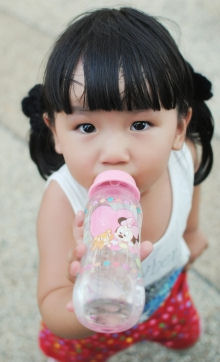ONE-MONTH-OLD
- Parental exhaustion: The emotional well-being of parents is particularly vulnerable at this point. Mother may still be recovering from the birth, but both parents are likely suffering from sleep deprivation. The baby's demands are great, but parents capacity to interact is not yet clearly defined. In addition, mothers may suffer from postpartum depression. The questionnaire given at this visit is used to assess postpartum depression. Despite the exhaustion and overwhelming nature of this current phase, you can establish yourselves as competent parents through a trial and error process.
- Fussiness: Between 3 and 12 weeks babies may develop fussy periods during the day. This fussiness is normal and represents the baby becoming overloaded and needing to release some of his/her tension in the late afternoon or early evening. Cycles of comforting and letting the baby cry for 1-2 minutes are worth trying.
- Thumb sucking: Thumb sucking represents the baby's initial attempts to soothe him-/herself. The use of a pacifier serves a similar function.
TWO-MONTH-OLD
- Cognitive Burst: Feeding and sleeping routines may be disrupted as the child gains more and more interest in the outside world.
- Play: Objects to manipulate become appropriate toys. Things to transfer with hands and bring to the mouth become good playthings. Face-to-face play also becomes more enjoyable.
- Work: If mother hasn't already returned to work, this may be the time when she considers returning to work. Concerns naturally arise about adequate child care and separation from the baby. Anxiety about separating from the baby is very natural. Many mothers and fathers feel they are missing out on spending time with their child when they return to work. Babies in child care tend to save their energy for the end of the day when they return home. This may be manifested in more protests, crying, or fussiness upon returning home.
FOUR-MONTH-OLD
- Feeding: Expect your baby to be easily distracted during feeding times and at times feeding refusal when exciting events are occurring.
- Sleeping: Expect increased bursts of sleep at night, but be wary of light sleep periods at which your baby may not need to come fully awake.
- Play: Provide opportunities for your baby to play during daily routines. Also encourage increased interest in manipulating objects.
SIX-MONTH-OLD
- Safety: As the baby begins to move around, issues of physical safety arise. Baby proofing the house will become important very soon.
- Limit-setting: The baby's curiosity and mobility raise concerns about limit setting.
- Sleeping and feeding: Changes in sleeping and feeding patterns may occur if they haven't already. Limit-setting around going down to sleep should begin. You can let your baby begin to feed him-/herself soft finger foods and experiment with a cup and/or spoon in the next couple of months.
- Stranger awareness: The baby will begin to become wary of anyone new.
NINE-MONTH-OLD
- Separation: Separations between you and your child are likely to become increasingly difficult over the next few months.
- Feeding: The baby's demands for control will increase. Finger feeding should be a mode of feeding with soft foods offered in between.
- Safety: By now your baby is probably very mobile and child-proofing is becoming very important.
TWELVE-MONTH-OLD
- Temper Tantrums: Tantrums can be expected in the second year of life. The best way to manage these tantrums is to first ignore the behavior while keeping the child safe. After the tantrum is over, give the child the warm support that he/she needs.
- Toilet Training: It is too soon to train but not to discuss this topic. Physically and emotionally children are usually ready between 18 months and 2 years of age.
- Aggression: Toddlers may scratch, bite, or hit especially when the exciting world is overloaded with new people and objects. These initial aggressive behaviors should be limited calmly without too much overt attention given to them.
FIFTEEN-MONTH-OLD
- Parenting responsibilities: The constant demands of keeping your child physically safe are intensified by the personal demands on the part of the child to be independent. Try to remand flexible while at the same time establish control over the child's behavior when it is truly necessary.
- Shifting attachments: The opportunity to begin playing more regularly with other children may be an appropriate channel for the child's increased capacity for new relationships. This is a wonderful time to involve your child in playgroups if he/she is not already in a group childcare setting.
EIGHTEEN-MONTH-OLD
- Temper tantrums: If you have not experienced these yet, they are likely to happen in the near future. It is important to keep your child safe but try to maintain consistency in your approach. Try to ignore the behavior but provide warmth and care after the tantrum is over.
- Safety: Toddlers do not have internal controls to stop themselves from taking extreme risks. He/she is also beginning to learn standards for his/her behavior. It is important to be vigilant in guiding your toddler as he/she negotiates stairways, climbs out of cribs, and darts away as he/she walks down the street.
- Childhood: The child and parents are experiencing the dramatic transition from infancy to childhood. The willfulness, negativity, and fluctuations between dependence and independence can create difficult situations. However, the development of the child's sense of self, social understanding, ability to use language, and more sophisticated play can be anticipated as outcomes of successful parenting.
- Toilet training: You can now look for and support signs of readiness for toilet training. The beginning steps can include talking about what wet and dry mean and focusing on the ability to undress and dress in preparation for toileting. It is appropriate to purchase a potty seat at this time.
TWO-YEAR-OLD
- Toilet training: You can continue to look for and support signs of readiness for toilet training. The beginning steps can include talking about what wet and dry mean and focusing on the ability to undress and dress in preparation for toileting. If you have not already purchased a potty seat, you can now do so.
- Emotionality: Be prepared for negativism at this age. Try to reflect the child's feelings with words and provide firm but comforting support when the child loses control to help the child gain an understanding of his/her emotional limits.
- Aggression: Often children can become aggressive when confronted by peers who get in his/her way or want the same toy he/she does. Prepare your child for these encounters and let him/her know that you expect the behavior to be controlled.
- Responsibility: It is not too early to begin assigning the child household chores. When a sense of competence is beginning to bloom at this, these patterns of helpfulness and responsibility can begin to be established.
- Television: Children of this age are particularly vulnerable to the negative effects of television because their imagination is increasing and learning is still largely dependent upon physical activity. Try to limit the amount and type of television your child watches.
THREE-YEAR-OLD
- Preschool: Parents need to find the kind of school program that best suits the needs of their child. At the age of three, emphasis should be on play as the primary means of understanding experience and the management of peer relationships.
- Sexual identity: Part of the job of a preschool child is to establish a sexual identity. Along with internal identity seeking is the active exploration of each others bodies. Be prepared for this and how to handle these situations.
FOUR-YEAR-OLD
- Mastery: This year is sometimes called the “the golden year.” Four-year-olds greet the world with open arms. They want to master the world but are still pulled by dependence on their parents. They pay increasing attention to their peers and forming strong friendships. They ask many “Why?” questions to find out about their world. Parents find themselves in new roles because they are no longer simply providing for their children.
- Transgressions: Wishes become lies. They likely say things that are untrue because they wish it to be true. These are examples of their magical thinking. Parents may feel angered or frightened by these behaviors but must realize this is a normal part of being four.
- Parental rejection: Four-year-olds may reject one parent as they try to understand each parent individually. This can be very difficult for the excluded parent unless they understand that this is predicable and enables the child to fully understand one parent at a time.
- Discipline: At this age, discipline involves teaching. Every “NO” needs a “Yes” or an explanation of why. Continue to set limits for your child and explain the reasons behind your limit setting.
FIVE-YEAR-OLD
- Fears: A new set of nightmares and fears may appear. Five-year-olds begin to be afraid of more intangible things such as disease or violence.
- Games: Games with rules and directions become very important. Fairness is also important at this age.
- Moral awareness: Moral begins to develop and they find themselves living with angry feelings. Five-year-olds are also able to feel empathy for others. The child becomes aware of the effect of his/her actions not only on the responses of others but also on his/her own feelings.
- Gender identity: Gender identity is at its peak. Five-year-olds have lots of questions about their bodies. They may identify with one parent over another.
- Fantasy vs. reality: Dreaming and wishing must now struggle to make way for reality. They still may play dress-up games or have imaginary playmates, but they are now able to differentiate fantasy from reality.
SIX-YEAR-OLD
- Entering first grade: Starting first grade is a major step. The teacher becomes the ultimate authority on a variety of matters. The child is a member of the world outside his/her family, and parents must realize that the child no longer just belongs to them. Parents may be fearful and mourn that they should have spent more time with their child.
- Moral development: Six-year-olds love to win, which may motivate them to cheat. It doesn't feel good because they are developing a conscience. Parents can talk with their child about how cheating will isolate him/her from others. They also have inflexible notions about right and wrong. Jealousy may be a motivation for tattling. Parents can help them consider the gray zones and the social consequences of tattling. Six-year-olds are also very egocentric. They will take something just because they want it. Parents can explain that dishonesty and stealing hurt everybody. Even if they can get away with it, it is not acceptable.
- Friendships: Belonging to the group becomes more important. Children segregate themselves into groups with their own gender. These relationships offer learning expectations and refuge from siblings. The child may distance him-/herself from parents. Parents may feel the loss.
- Goal of interdependence: The child's explorations and independence from parents may alarm parents. However, the ultimate goal is interdependence rather than independence.
|




